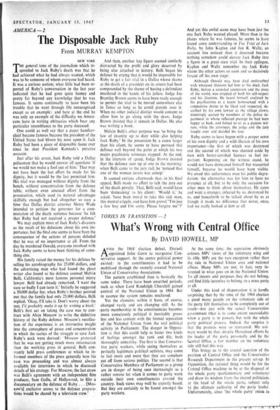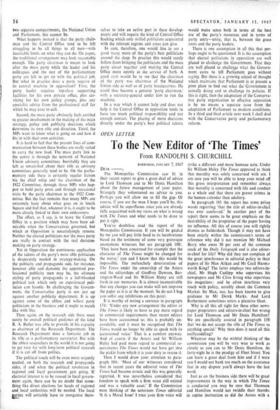What's Wrong with Central Office
TORIES IN TRANSITION-2
By DAVID HOWELL, MP
AFTER the 1868 election defeat, Disraeli appointed John Gorst to reorganise Con- servative support. At the centre political power existed: in the constituencies it had to be mobilised through the recently created National Union of Conservative Associations.
The pattern established then is basically the same today. There have been unsettled periods, such as when Lord Randolph Churchill gained control of the National Union in 1884. But in essence the system remains unaltered.
Yet the elements within it have, of course, changed vastly and are changing still. As the -party membership in the constituencies becomes more consciously political it inevitably grows less and less content with the formal separation of the National Union from the real political activity in Parliament. The danger in Opposi- tion is that this could help to foster two kinds of feelings amongst the rank and file, both thoroughly unhealthy. The first is that Conserva- tive party workers, while seeing themselves as perfectly legitimate political activists, may come to feel more and more -that they are somehow cut off from serious politics. The second is that Conservative Members of Parliament as a group are in danger of being seen increasingly as a rather remote lot when it comes to party work outside their own constituencies around the country. Such views may well be unjustly based. But they are certainly to be found amongst the party workers.
At the same time, the separation obviously colours MPs' views of the voluntary wing and its thle. MPs are the rare exception rather than the rule in National Union area and national offices. Many MPs are not, in fact, very in- terested in what goes on in the National Union. To all intents and purposes they do not belong. and find little incentive to belong, to a mass party at all.
Under this kind of dispensation it is hardly surprising that by the time of the 1964 election a good many people on the voluntary side of the party felt themselves to be completely out of touch—not just with the actual Conservative government (that is to some extent unavoidable when a party is in power), but with the whole party political process. Indeed, the surprise is that the protests were so restrained. My esti- mate would be that. despite Herculean efforts by the leader of the party personally and by the Central Office, a fair number on the voluntary side still feel this way.
This brings us to the crucial question of the position of Central Office and the Conservative Research Department in the present set-up. In Opposition, the rational thing would be for the Central Office machine to be at the disposal of the whole party (parliamentary and voluntary) and draw its wisdom from the elected politicians at the head of the whole party, subject only to the ultimate authority of the party leader. Unfortunately, since 'the whole party' exists in
two separate compartments, the National Union and Parliament, this cannot be.
What happens instead is that the party chair- man and the Central Office tend to be left struggling to be all things to all men—with inevitable limits on what they can do. On paper, the traditional arrangement may look reasonable enough. The party chairman is meant to look after the mass party while the leader and his colleagues and the rest of the parliamentary party are left to get on with the political job. But what in practice does a party require of its central machine in opposition? First, the party leader requires top-class supporting facilities for his own private office, plus ser- vicing for his own policy groups, plus any specialist advice from the professional staff for which he may care to call.
Second, the mass party obviously feels entitled to greater involvement in the making of the main strategy, policy and publicity decisions which determine its own role and direction. Third, the MPs want to know what is going on and how it fits in with their own activities.
It is hard to feel that the present lines of com- munication between these bodies are really suited to carry the new load. The mass party link to the centre is through the network of National Union advisory committees. Inevitably they are left as unsatisfied about their role as advisory committees generally tend to be. On the parlia- mentary side there is certainly regular liaison via the chief whip and the chairman of the 1922 Committee, through those MPs who hap- pen to hold party posts and through occasional visits by the party chairman to the 1922 Com- mittee. But the fact remains that many MPs are extremely hazy about what goes on in Smith Square and feel that, whatever it is, it ought to be more closely linked to their own endeavours.
The effect, as I say, is to leave the Central Office in a position which may have been ad- mirable when the Conservatives governed, but which in Opposition is unsatisfyingly remote. Neither the elected politicians nor the mass party are really in contact with the real decision- making on party strategy.
Yet in Opposition the continuous application of the talents of the party's most able politicians is desperately needed in strategy-making.. On the publicity and propaganda side, for instance, however able and dynamic the appointed pro- fessional publicity men may be, the ultimate styling of party propaganda is a full-blooded political task which only an experienced poli- tician can handle. In challenging the Govern- ment, the Conservative party is not just up against another publicity department. It is up against some of the ablest and wiliest party politicians in the business and it ought to match like with like.
Then again, on the research side there must surely be overall political guidance of the kind R. A. Butler was able to provide in his capacity as chairman of the Research Department. The Research Department does a fantastic job in its rale as a parliamentary secretariat. But with the ablest researchers in the world it is not going to get very far with long-term political research if it is cut off from politics.
The political touch will be even more urgently needed, on both the research and propaganda sides, if and when the political revolution in regional and local government gets going. If electoral interest is to be roused in local govern- ment again, there can be no doubt that some- thing like direct elections for heads of regional and local authorities will be needed. The local &Lies will certainly have to reorganise them-
selves to take an active part in these develop- ments and will require the kind of Central Office backing which only skilled politicians acquainted with the relevant regions and areas can give.
In sum, therefore, one would like to see a good many more of the party's best politicians around the shop. In practice this would surely follow from bringing the politicians and the mass party closer together and making the Central Office more openly at the service of both. A good start would be to see that the chairman of the party was chairman of the National Union side as well as of party headquarters. He could thus become a genuine 'party chairman,' with a secretary-general under him to run the machine.
In a way which it cannot help and does not help it the Central Office in opposition tends to have too much political responsibility and not enough contact. The placing of more decisions directly under the party's best political talents would make sense both in terms of the best use of the party's resources and in terms of party unity—unity, that is, between the grass roots and the party leaders.
There is one assumption in all this that per- haps ought to be questioned. It is the assumption that elected politicians in opposition are well placed to challenge the Government. That they are well placed to challenge what the Govern- ment cares to tell Parliament goes without saying. But there is a growing school of thought which maintains that Parliament is at present a poor place to find out what the Government is actually doing and to challenge its policies. If this is right, then the adaptation of the Conserva- tive party organisation to effective opposition is by no means a separate issue from the adaptation of Parliament to modern conditions. In a third and final- article next week I shall deal with the Conservative party and parliamentary reform.































 Previous page
Previous page